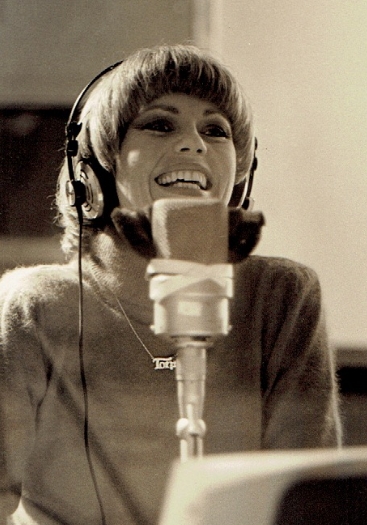(Click here to read Part One of the story...)
The Smiths/Morrissey listening party took place in my aunt Toni Tennille's kitchen. Being that the tone of the music is rather contemplative, the cheerful yellow-painted room with its colorful animal paintings and elegant French pottery was a unlikely setting. But there we were: me, my boyfriend Michael, and my aunt Toni, with a stack of records waiting to be played: the Smiths self-titled debut,1985's Meat is Murder, and my beloved The Queen is Dead.
Toni picked up Meat Is Murder and studied the cover. “Interesting.”
Caroline and Toni disucss the Smiths album, Meat Is Murder
“Morrissey is a very outspoken vegetarian,” I said. “The title song on that album is about a slaughterhouse.”
Toni’s eyes opened wide. “Really? I have to hear that.” She is a life-long vegetarian, too.
“But not first,” Michael said. “Let’s start with a video of one of the Smith’s live performances. So you can see what a Morrissey performance is like.” He cued up an mid-eighties video of the Smiths performing “This Charming Man” on the laptop.
“I think Morrissey’s style is great,” I said. “But he can be a little polarizing to some people.”
“Polarizing?” said my aunt. “Even among his own generation?”
“He can come off kind of arrogant. He just does and says whatever is on his mind, and doesn’t worry about how it comes off. “ I struggled to explain. “Morrissey’s a strange guy.”
Toni grimaced. “Well, I was married to a strange guy so I’m used to it.”
Michael started the video and there was Morrissey, wheeling around in a loose blouse unbuttoned to his navel, kicking and waving his hands in the air. A tangled bouquet of long-stemmed roses dangled from the back pocket of his jeans.
“Wow,” said Toni. “He’s pretty animated.” Morrissey swayed and clutched the tangle of beads around his neck, artfully turning his face to the spotlight as he sang. After watching that for a minute, Michael switched to another video, this one a 1986 interview of Morrissey from the cult MTV program, The Cutting Edge.
“Now you should hear Morrissey actually speak,” Michael explained, exchanging a knowing smile with me over the laptop.
The interview began with Morrissey, looking especially thin and petulant, speaking directly into the camera. “Most of the music today in the popular charts I find repellant,” he sighs, leaning a slender hand on his brow as though the mere thought of such repellant music is physically injurious to him.
“Ha!” said Toni. “He’s probably talking about me when he refers to ‘repellent music'. But that’s ok.”
Two minutes of Morrissey’s moaning through the interview was about the most any of us could take.
“Let’s get to the music,” Michael said. “What should we listen to first?”
“’Girlfriend in a Coma’?” I suggested.
“Who’s in a coma?” asked Toni.
Michael picked up the Smiths first album. “How about ‘Heaven Knows I’m Miserable Now’?”
“Uh, yeah, I guess so,” Toni said. “That sounds like a song to start your day with.”
Michael put on the record and Morrissey’s voice, buoyed by Johnny Marr’s jangly guitars, filled my aunt’s sun-dappled kitchen. Toni cocked her head to listen.
“I was happy in the haze of a drunken hour, but heaven knows I’m miserable now…” Toni leaned forward, listening intently. “…In my life, why do I give valuable time, to people who don’t care if I…live or die?” Morrissey’s voice leapt to a high falsetto on the last phrase.
“There’s your hook right there,” Toni said, pointing her finger in the air.
“…In my life, why do I smile at people who I’d much rather kick in the eye.” We all burst out laughing.
“He’s got to be kidding!” Toni hooted. “Kick in the eye?”
“But come on Toni,” I said. “Don’t you think the lyrics are really honest? I mean, haven’t you ever been angry at yourself for being nice to people you shouldn’t? That’s what Morrissey is saying. He’s singing about the absurdity of it all.”
“Well, yes,” Toni admitted. “But I guess when I wrote songs I tried to be more…positive and joyous. But I can understand why people would love it. What’s next?”
We decided on the pensive ballad “Please, Please, Please Let Me Get What I Want.” Morrissey’s morose vocals rose and fell against the classical strumming of Johnny Marr’s guitars.
“That’s it?” Toni said when the song faded out. “I was waiting for the bridge." She frowned. "Wow, I kind of feel sorry for the guy. He just seems so…unhappy. But I like that song better than the 'kick me in the eye' one.”
“Let’s try something more upbeat,” I said. “Play ‘Cemetery Gates’.”
“A song called ‘Cemetery Gates’ is uplifting?” Toni said.
“It’s about being kids playing in a cemetery,” I explained. “Its actually very pretty.”
“Keats and Yeats are on your side,” Toni repeated as we listened. “Hmm. I like this song better. But I don’t quite get the ‘big nose who knows’ part.”
Next up was one of my favorites, “Big Mouth Strikes Again.” The song opens with a jaunty torrent of Spanish-style guitars. “Sweetness,” Morrissey croons as the drums kick in, “sweetness I was only joking when I said I’d like to smash every tooth in your head…”
“Smash your what?” My aunt said.
“Every tooth in your head,” I supply helpfully over the music. My aunt just stares back at me with her mouth open. But after a few moments even she is pulled in by the fast and infectious rhythm of the song, tapping her fingers to the beat and raising her eyebrows appreciatively when Morrissey “la-di-da-da’s” smoothly over the melody. It is clear she likes the song, but when Morrissey starts in about Walkmans melting and people being bludgeoned in their beds she puts her hands over her face and shakes her head.
“I just can’t get over the lyrics,” she says when the song ends. “The music arrangements are really good…but God, those lyrics! I just don’t know if I’m supposed to take him seriously or not.”
“I think that’s the point,” I said. “In one way he’s being dead serious, and then suddenly the joke’s on you.”
“I guess,” Toni said. “I would just never think to write a song that way. Do you think that the words come from his heart? Or does he even care if they come from his heart?”
I thought for a moment. “Yes, I think they do come from his heart. But it goes through a kind of sarcastic filter on the way out. That’s what makes the songs special.”
“Ok, I get it,” Toni said. “I do have to admit I kind of like it. And I can tell he isn’t Auto-Tuned or any of that nonsense. It is definitely his own voice, and I admire that.”
“They weren’t really doing Auto-Tune back when this was recorded,” Michael said. “But Morrissey would never have used it anyway.” He picked up another album and cued up the song “There Is a Light That Will Never Go Out.”
“Now this one is good,” Toni said halfway through. “Very pretty melody. The words aren’t bad either except for that part about being hit by the double-decker bus.”
“But again, that is where the joke kind of comes in,” I said. “I don’t think he really wants to be hit by a bus. It’s just the feeling of being really young and hopelessly in love…and finally feeling at home with someone. You are so happy in that moment you don’t care if you die.”
“Exactly!” Toni said. “That’s what he said, right? That he wants to die.”
“Yes, in a sense. But it’s more the all-encompassing emotion of someone who typically feels unwanted, and suddenly they are loved. And at that very moment that feeling means more than life. Kind of like when people joke, ‘I have done this wonderful thing and now I can die happy.’ Not necessarily wanting to commit suicide.”
“Okay,” Toni said. “I can see what you’re saying. I just would never write something in a song that was so…literal. But the music is great.” She smiled at me. “I can see you, Caroline, as a teenager, sitting in your room listening to this.”
“I think I wore down the grooves on the record. Toni, who did you listen to when you were a teenager? What singer or band spoke to you when you were feeling misunderstood and alone?”
She thought for a moment. “Well, I loved all the same music Daddy did…big band and jazz. My musical tastes have always been very eclectic. But what did I listen to alone the most? Frank Sinatra.”
“Aha!” Michael said. “Another great crooner.”
“The best crooner,” Toni added.
“And what was Frank Sinatra singing about that made you connect with him?” I asked.
Toni tilted her head as she thought. "Well, probably some of the same things, mooning over unrequited love. But the lyrics weren’t so literal. Maybe it’s a generational thing. I also loved opera.”
“There you go,” I said. “Opera practically invented musical melodrama. What opera doesn’t end with someone stabbing themselves with a sword? But the audience isn’t expected to take it at face value. It’s the same here.”
We ended the listening session with “Meat is Murder”, Morrissey’s hold-nothing-back diatribe about the horrors of a slaughterhouse. As the song begins in a slow, mournful array of sad moos and other animal sounds, Toni recalled when she lived in Arizona and her neighbor would raise a steer from a calf to adult. Then one day the fattened steer would be loaded in a trailer to go off and become a freezer full of steak for its owner. “I named him Johnny Appleseed,” Toni said wistfully, “because I would feed him apples over the fence. I always dreaded the day I’d look out into the field and not see Johnny there. So sad.” The animal noises gradually become overtaken by a hypnotic guitar melody. “However, I still eat fish.”
Morrissey’s voice sings solemnly. “This beautiful creature must die, this beautiful creature must die…a death with no reason, death with no reason, it’s murder…”
“Ok that’s enough!” Toni yells. Michael pauses the song and we all burst out in laughter. “Well, okay. I am speechless. I mean, I agree with him obviously, but…wow!”
Overall, Toni decided that despite the portentous lyrics and Morrissey’s flat vocal redundancy, she really liked the music of the Smiths. “I can understand how this music touched your generation," she said. "It doesn’t affect me quite as much because I’m from completely different era. But I get it.” And I could tell she really did.
We topped off our listening party with dinner at a local steakhouse. A funny choice for three vegetarians, yes, but the Indian place was closed and the steakhouse had surprisingly good salads and vegetable dishes. Plus, they had a full bar so we could toast to Morrissey and the Smiths with a proper drink.
“Here’s to discovering new music!” I said, raising my glass.
“Here’s to Morrissey!” Toni added as we clinked glasses. All around us people tucked into steaks the size of steering wheels while we happily dug into our stuffed mushroom appetizer.
Morrissey would have been absolutely horrified.







